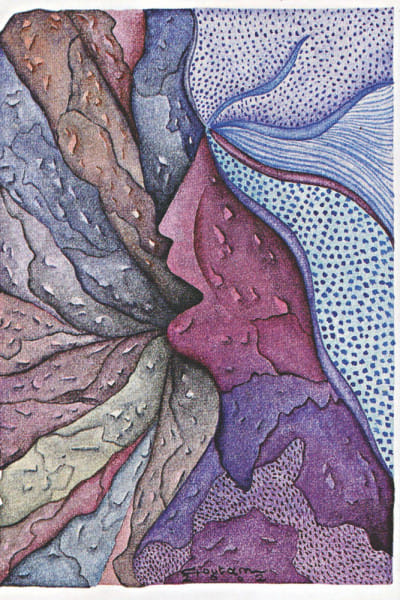Personally speaking

In my imagination, I see myself in a beautiful home showered by the golden afternoon sunlight, the slant rays flirting with my plush plants, the room filled with a heady aroma of cinnamon tea being brewed and scones being baked, a happy child heading out to the playground and me, curled up in my favourite corner either with a book or magazine, after returning from work.
No worries, no stress and life like this could go on never-endingly.
Reality for me was nothing like that image. I was so immersed in that façade of happiness that somewhere I missed the fine prints of life and I lost the signal and skipped the cue.
For once, the happy child that I thought I saw, was not happy and I failed to support this emotional turmoil, again, when my father left me standing all by myself without saying goodbye, or him giving me one of his famous pep talk on how I would live without him, my paradise was lost forever.
I did not see it coming until I found myself at rock bottom, shrouded in melancholy. And that's when the antidepressants made their way into my world. I found out I am not the only one who needs to sort the tangles of their mind; there are many like me, and a lot more who do not realise the importance of maintaining mental health.
With globalisation, we have adopted many prejudicial or damaging nuances in our social and private lives. For one, the velocity with which our high paced corporate living style and constant need to feed our virtual egos and identities are accelerating, things can be quite exhausting. And these, at times, make us reach for the handbrake. Hence, the need for counsellors, psychiatrists, therapists, arises for some of us who find it suffocating or too much to grasp.
Setting the parameters
Society has a longstanding misinterpretation and superstition regarding mental health. There's a key difference between 'mental health awareness' and 'mental illness.' People usually make the mistake of associating the two.
Mental Health Awareness does not only deal with the illness of the mind, but also acknowledges the process of taking care of it, realising one's own deficiencies and abilities regarding mental health, and staying productive while dealing with daily stress. When a person's attitude and feelings are normal, they are considered to be mentally healthy; whereas mental illness maps out the diseases of the mind.
"Every one of us must take care of our mental health, like dental health or physical health, and seek professional help when we suffer from mental illness just like we would see a dentist when we have a toothache.
"Mental illnesses are health conditions involving changes in emotion, thinking or behaviour (or a combination of these). Mental illnesses are associated with distress and/or problems functioning in social, work or family activities (APA) and wellbeing is a keyword in the WHO definition of health — "a state of complete physical, mental and social well-being and not merely the absence of disease or infirmity," says Dr Helal Uddin Ahmed, Associate Professor, Child Adolescent and Family Psychiatry, National Institute of Mental Health (NIMH) and Secretary General of Bangladesh Association for Child & Adolescent Mental Health (BACAMH).
On the stigma of being ill
You would often hear people in small towns or villages say colloquially that one has caught 'bad air' or 'batash lagse.' In other words, they say evil spirits have taken over the person or the child and they seek the help of village shamans or 'ojhas.'
"The shamans often tie the person concerned to a tree, beat with sticks, scorch with burning stamps, and make them walk on fire— all to get the 'spirit' out of the possessed body. A few years ago, Prothom Alo, the Bangla daily, published a picture of two new-born babies that were hung upside down and were being banged together for similar reasons.
"Such treatments are deadly, and a traumatic experience for the patient no doubt, and all the while, the villagers and neighbours standby and watch. The talisman or religious blow-on might have placebo effect, but it cannot cure the ailing mind. Moreover, the traumatic experience darkens the patient's spirits more," says Dr Niaz Mohammad Khan, Associate Professor, National Institute of Mental Health (NIMH).
Dr Avra Das Bhowmik, Associate Professor, NIMH also expressed his concern over this general behaviour of treating mental illness.
"Recently, this practise of calling shamans is becoming less frequent because of the general awareness building up among villagers; they take the patient to government health complexes or community hospitals. The need of the hour is to make these hospitals equipped with doctors who can give them the first medication and refer them to psychiatrists, or counsellors. Also, the MBBS syllabus must include early management course on psychiatry. We have approximately 250 or so working psychiatrists in the country, this number should increase and more doctors should take up this study.
We should address the misconception and stigma associated with mental health through general education, orientation to the general doctors, and for our patients, family support is a key factor.
The caregivers' angle
Sleepless nights and bloodshot eyes, the flooding of ideas and thoughts and the incessant chatters followed by cups of caffeine and puffs of nicotine, tackling and debating with ease on topics like Che or Mao or Shabagh Mancho to onions prices all at one go; you think your friend is a genius.
But his mother knows, her son needs to sleep, needs to take a pause, needs to calm down. His hyper overdrive or manic phases will soon be overshadowed with dark moods and self-harm acts. The panic-stricken nights when the mother silently stands outside his doors, sobbing and praying that behind the doors he banged closed, that her son is safe and that the demons in his heads are not torturing him to the edge.
The unsteady steps, the monologues, the sleep paralysis, the phobias and obsessive-compulsive disorders are all things we need to discuss at large within the family boundaries, and learn to tackle each episode calmly.
Family members of a person suffering from mental illness or disorders shoulder the vast majority of long-term care responsibilities towards the patient. This also put a severe pressure on the caregivers or family members, for example they suffer from adverse health effects such as elevated stress and depression, feelings of stigmatisation, chronic medical conditions, the need to use of tranquilisers and antidepressants for themselves and that too ever so often. Their quality of life has to be compromised, not to forget the financial stresses, and limiting time for leisure and socialising. The family members too should regularly distress to a counsellor to continue supporting the ill. The parent or the caregiver should be given ample social support and adaptive coping ideas, they must know that solving the problem and tackling it head on is more effective than avoidance and that there are other emotional coping strategies to de-stress yourself.
The importance of hospitals and doctors
With a lost look in his eyes, a man in his mid-twenties is walking down the dark and dreary corridors of National Institute of Mental Health Hospital at Shyamoli. The Tk 10 ticket allows him to see a psychiatrist.
The sun never rose in these long, spacious yet dirty passageways, and most of the people there are dishevelled and listless. If you just pace through these hallways at the huge building of the mental health hospital, you would get the exact visuals of how we perceive mental health.
Languid and lethargic, no one shows any interest to sweep away the dirt and cobwebs, no one shows a special interest to brighten up the wards or counselling rooms. Yet, I would say the doctors there are extremely professional and tolerant with their patients trying their best under the circumstances.
The National Institute of Mental Health was established and started its journey from 2001. At present, the hospital houses 200 indoor beds with seven departments — Adult psychiatry, Child, Adolescent and Family Psychiatry, Social and Community Psychiatry, Organic and Geriatric Psychiatry, Psychotherapy, Forensic Psychiatry, Addiction Psychiatry, and they have five OPD (outpatient departments) daily.
The old four storied building is being renovated to eight levels. This vertical extension will be adding 200 to 400 existing beds and is expected to run from 2020. Currently, the hospital houses 180 to 200 in-patients in a month. The insufficient doctor team at the hospital get more than 300 daily out-patients.
Generally speaking, the doctors are witnessing an increase in patients but they are attributing the trend to awareness building. According to the national survey, results show an increase of patients, 17 percent among adults and 14 percent among children. There are very few hospitals catering to mental illness in the city and NIHM is in dire straits and overburdened, not exactly a place where we can go for counselling. Thus, along with psychiatrists the city needs affordable hospitals providing counselling and psychotherapy.
______________________________________
To understand better, here is the difference between a counsellor, a therapist, a psychiatrist and a clinical psychologist:
Mental health experts: include psychiatrists and psychologists.
Mental health professionals: include psychiatrists and psychologists, psychiatric social workers among others.
Mental health workforce: includes occupational therapists, speech therapists, and physiotherapists among others.
Psychiatrist: Psychiatrists are physicians who manage mental illness. They are the only mental health professionals trained to combine physical (organic or medical), psychological and social.
Clinical Psychologist: A clinical psychologist is a mental health professional with highly specialised training in the diagnosis and psychological treatment of mental, behavioural and emotional illnesses. Counsellor/Therapist: Mental health professionals, having university degree/ training on basic counselling and therapy actors in understanding aetiology and recommending management of psychiatric disorders.

 For all latest news, follow The Daily Star's Google News channel.
For all latest news, follow The Daily Star's Google News channel. 



Comments